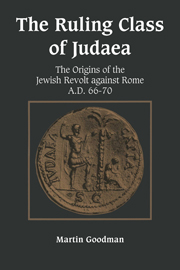Book contents
- Frontmatter
- Contents
- Abbreviations
- Preface
- Maps
- 1 Introduction
- PART I THE RULING CLASS A.D. 6–66
- PART II FACTION STRUGGLE WITHIN THE RULING CLASS
- 6 Reactions to failure: the ruling class a.d. 6–66
- 7 The outbreak of revolt
- 8 The independent Jewish state a.d. 67–70
- 9 Trends in faction politics a.d. 50–70
- PART III THE AFTERMATH OF THE REVOLT
- Select bibliography
- Index
8 - The independent Jewish state a.d. 67–70
Published online by Cambridge University Press: 01 June 2011
- Frontmatter
- Contents
- Abbreviations
- Preface
- Maps
- 1 Introduction
- PART I THE RULING CLASS A.D. 6–66
- PART II FACTION STRUGGLE WITHIN THE RULING CLASS
- 6 Reactions to failure: the ruling class a.d. 6–66
- 7 The outbreak of revolt
- 8 The independent Jewish state a.d. 67–70
- 9 Trends in faction politics a.d. 50–70
- PART III THE AFTERMATH OF THE REVOLT
- Select bibliography
- Index
Summary
The equilibrium in Judaean politics achieved by the end of a.d. 66 under the leadership of Ananus b. Ananus was not to last. The coalition's prestige was severely shaken by its failure in Galilee: Josephus' efforts to hold the area against Rome on behalf of the Jerusalem government were finished by the summer of a.d. 67, and by the autumn his successor John of Gischala had also given up the struggle.
In Jerusalem Eleazar b. Simon, the powerful priest deposed from office by Ananus after Cestius Gallus' defeat, began, with his associates who sported the name of ‘Zealots’, to campaign for more effective leadership. At first tolerated by Ananus, he was by the winter penned up with his supporters inside the Temple where he had taken refuge. In the meantime John of Gischala, who had at least seen action against the Romans, became something of a popular hero on his escape from Galilee and his arrival in Jerusalem, and in early spring a.d. 68 he abandoned his alliance with Ananus and joined forces with Eleazar b. Simon.
The fate of Ananus' party was sealed when the leaders of the Idumaeans, who had hitherto remained neutral in the Judaean political struggle, threw in their support for John and Eleazar. On a dramatically stormy night in late spring a.d. 68, they infiltrated into the city, and Ananus and many of his more prominent followers were killed.
- Type
- Chapter
- Information
- The Ruling Class of JudaeaThe Origins of the Jewish Revolt against Rome, A.D. 66–70, pp. 176 - 197Publisher: Cambridge University PressPrint publication year: 1987



